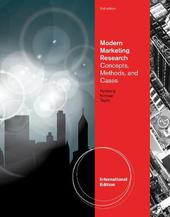
|
Modern Marketing Research: Concepts, Methods, and Cases, International Edition (with Qualtrics Printed Access Card)
Mixed media product
Main Details
| Title |
Modern Marketing Research: Concepts, Methods, and Cases, International Edition (with Qualtrics Printed Access Card)
|
| Authors and Contributors |
By (author) Fred M. Feinberg
|
|
By (author) James Taylor
|
|
By (author) Thomas Kinnear
|
| Physical Properties |
| Format:Mixed media product | | Pages:720 | | Dimensions(mm): Height 277,Width 218 |
|
| Category/Genre | Market research |
|---|
| ISBN/Barcode |
9781133191025
|
| Classifications | Dewey:658.83 |
|---|
| Audience | | Tertiary Education (US: College) | |
|---|
| Edition |
2nd edition
|
|
Publishing Details |
| Publisher |
Cengage Learning, Inc
|
| Imprint |
South-Western College Publishing
|
| Publication Date |
28 February 2012 |
| Publication Country |
United States
|
Description
Descriptive and analytical, MODERN MARKETING RESEARCH: CONCEPTS, METHODS, AND CASES, 2E, International Edition is a comprehensive introduction to the practice of marketing research. The book walks you through each step of the marketing research process, from project design and data collection to analyzing findings with statistical methods and preparing the final report. Making sense of complex marketing data, MODERN MARKETING RESEARCH: CONCEPTS, METHODS, AND CASES, 2E, International Edition explains in detail the analytical and statistical approaches essential in marketing research, including standard multivariate methods like Factor, Cluster, and Conjoint Analyses, as well as the latest Hierarchical Bayes, Heterogeneity, and Sample Selection techniques. More than three dozen in-text cases highlight research projects in business and academic settings, while numerous examples and special interviews with industry experts give you an in-depth perspective of marketing research and its applications in the real world.
Author Biography
Fred M. Feinberg is Professor of Marketing at the Ross School of Business, University of Michigan. Previously a faculty member at Duke University's Fuqua School of Business and the University of Toronto's Rotman School of Management, he has taught project-oriented Marketing Research for the last two decades. Dr. Feinberg's research centers on decision-making behaviors, advertising models, and consumer variety seeking. He is Associate Editor at Marketing Science and the Journal of Marketing Research, Senior Editor for Marketing at Production and Operations Management, and has published two other texts: Marketing Engineering and Statistical Methods for Management. He holds undergraduate degrees in Mathematics and Philosophy from the Massachusetts Institute of Technology, did graduate work in Mathematics at Cornell University, and received a Ph.D. in Management from the M.I.T. Sloan School of Management. James R. Taylor is S. S. Kresge Professor Emeritus of Marketing at the Ross School of Business, University of Michigan, where his teaching and research centers on strategic marketing planning, market segmentation, marketing research, and marketing management. In addition to dozens of articles, which have appeared in The Journal of Marketing, Journal of Marketing Research, Journal of Consumer Research, and other publications, he has authored ten books and monographs, including Emerging Markets Simulation; Marketing Research: An Applied Approach and Exercises in Marketing Research; and Introduction to Marketing Management: Text and Cases. Dr. Taylor has served as V.P. of the Detroit Chapter of the American Marketing Association, Executive Secretary of the Association of Consumer Research, and on the editorial boards of the Journal of Marketing, Journal of Marketing Research, and the Journal of Consumer Research. Prior to academia, Dr. Taylor worked for General Mills and Accenture, as well as Booz, Allen & Hamilton, and continues to consult for numerous businesses, including General Electric, Ford, DuPont, G.T.E., Johnson & Johnson, General Foods, and Procter & Gamble. An active lecturer for company management programs, Dr. Taylor has given presentations all over the world. He received his Ph.D. from the University of Minnesota with specializations in marketing, psychology, and statistics. His dissertation, "An Empirical Evaluation of Coombs' Unfolding Theory" won the American Marketing Association Dissertation Award. Thomas C. Kinnear is Eugene Applebaum Professor of Entrepreneurial Studies and Professor of Marketing, Ross School of Business, at the University of Michigan, where he is also Executive Director of the Samuel Zell and Robert H. Lurie Institute for Entrepreneurial Studies. He previously held a faculty appointment at the University of Western Ontario, and visiting appointments at Harvard University and Stanford University. Dr. Kinnear's work in marketing planning and research has appeared in numerous scholarly journals, including the Journal of Marketing, Journal of Marketing Research, and the Journal of Consumer Research. A former editor of both the Journal of Marketing and Journal of Public Policy and Marketing, he coauthored textbooks entitled Principles of Marketing, Marketing Research: An Applied Approach; Promotional Strategy; Cases in Marketing Management; and StratSimMarketing and PharmaSim (simulations). Consulting to major corporations, such as Aetna, AT&T, General Motors, and Kodak, his industry specialties include telecommunications, automotive, petroleum, heating and air conditioning, and others. Dr. Kinnear is a past director of the American Marketing Association and the Association for Consumer Research, and is currently on the board of directors for several companies and nonprofits. He holds an undergraduate and honorary L.L.D. degree from Queen's University, Kingston, Ontario; an M.B.A. from Harvard University; and a Ph.D. in Business Administration from The University of Michigan.
Reviews1. Purpose and Process of Marketing Research. 2. Research Design and Data Sources. 3. Measurement in Marketing Research. 4. Causal Designs and Marketing Experiments. 5. Data Collection: Exploratory and Conclusive Research. 6. Designing Surveys and Data Collection Instruments. 7. Sampling. 8. Data Analysis and Statistical Methods: Univariate and Bivariate Analyses. 9. Modeling Multivariate Relationships: Multiple Regression for Interval, Binary, and Nominal Dependent Variables. 10. Factor, Cluster, Discriminant, and Latent Class Analyses. 11. Conjoint Analysis and Multidimensional Scaling. 12. Advanced Topics, Research Frontiers, and Preparing the Final Report.
|